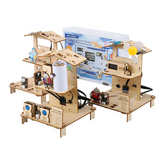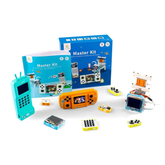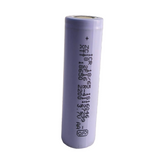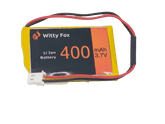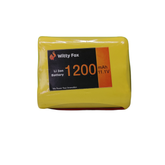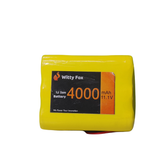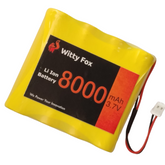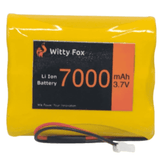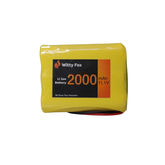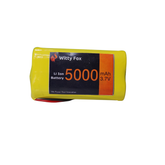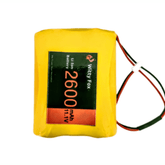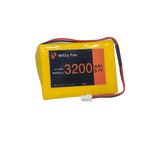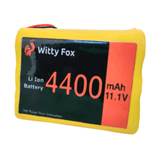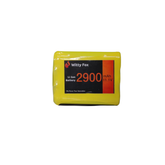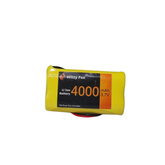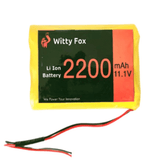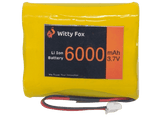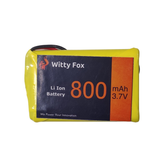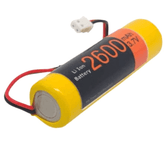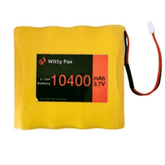-
18650 2200mAh 3.7v Cylinder Rechargeable Li-Ion Battery (Any Colour)18650 2200mAh 3.7v Cylinder Rechargeable Li-Ion Battery The Li ion 18650 Cylindrical rechargeable battery boasts several advantages over NiMH batteries, including a lack of memory effect and a longer storage life. Additionally, This battery has a higher energy density and is lighter weight than...
- Rs. 174
Rs. 249- Rs. 174
- Unit price
- per
Save Rs. 75 -
Witty Fox 3.7V 400mAh Li-Ion BatteryWitty Fox 3.7V 400mAh Li-Ion Battery The lithium-ion rechargeable batteries are widely used in GPS, DVD, Tablet PC, MP4 Player, Power Bank, Mobile Backup Power Supply, Bluetooth Speaker, IOT and Industrial applications. Features: Pack over-voltage Protection Pack under-voltage Protection Over voltage Protection, CELL Under-voltage Protection,...
- Rs. 185
Rs. 249- Rs. 185
- Unit price
- per
Save Rs. 64 -
Witty Fox 11.1V 1200mAh Li-Ion BatteryWitty Fox 11.1V 1200mAh Li-Ion Battery The rechargeable lithium-ion battery from Witty Fox, boasting 11.1V and 1200mAh capacity, finds wide application in diverse electronic devices such as GPS, DVD players, tablet PCs, MP4 players, power banks, mobile backup power supplies, Bluetooth speakers, IOT devices, and...
- Rs. 365
Rs. 440- Rs. 365
- Unit price
- per
Save Rs. 75 -
Witty Fox 11.1V 4000mAh Li-Ion BatteryWitty Fox 11.1V 4000mAh Li-Ion Battery The Witty Fox 11.1V 4000mAh Li-Ion battery is a versatile and rechargeable lithium-ion battery that is commonly used in a wide range of electronic devices, from GPS and DVD players to Bluetooth speakers and industrial applications. With pack over-voltage...
- Rs. 807
Rs. 1,189- Rs. 807
- Unit price
- per
Save Rs. 382 -
Witty Fox 3.7V 8000mAh Li-Ion BatteryWitty Fox 3.7V 8000mAh Li-Ion Battery This 3.7v Lithium-Ion battery is a very slim, extremely lightweight battery based on the new polymer lithium-ion chemistry. This Li ion battery is the highest energy density battery currently in production. Each cell outputs a nominal 3.7v. These Li ion batteries require special...
- Rs. 522
Rs. 783- Rs. 522
- Unit price
- per
Save Rs. 261 -
Witty Fox 3.7V 7000mAh Li-Ion BatteryWitty Fox 3.7V 7000mAh Li-Ion Battery This is 3.7 volt lithium ion battery of 7000 mAh, the Li-ion battery is one of the most modern battery technologies available. Lithium ions are the primary element in its electrochemistry. Lithium can easily pass through a micro-permeable separator...
- Rs. 469
Rs. 687- Rs. 469
- Unit price
- per
Save Rs. 218 -
Witty Fox 11.1V 5200mAh Li-Ion BatteryWitty Fox 11.1V 5200mAh Li-Ion Battery This is the 11.1v 5200mAh li-ion battery, Li-ion battery is one of the most modern battery technologies available. Lithium ions are the primary element in its electrochemistry. Lithium can easily pass through a micro-permeable separator because of its extremely...
- Rs. 1,187
Rs. 1,616- Rs. 1,187
- Unit price
- per
Save Rs. 429 -
Witty Fox 11.1V 2000mAh Li-Ion BatteryWitty Fox 11.1V 2000mAh Li-Ion Battery The lithium-ion rechargeable batteries are widely used in GPS, DVD, Tablet PC, MP4 Player, Power Bank, Mobile Backup Power Supply, Bluetooth Speaker, IOT, and Industrial applications. FEATURES: Pack over-voltage Protection Pack under-voltage Protection Over voltage Protection, CELL Under-voltage Protection,...
- Rs. 503
Rs. 746- Rs. 503
- Unit price
- per
Save Rs. 243 -
Witty Fox 3.7V 10000mAh Li-Ion BatteryWitty Fox 3.7V 10000mAh Li-Ion Battery This 3.7v Lithium-Ion battery is a very slim, extremely lightweight battery based on the new polymer lithium-ion chemistry. This is the highest energy density Li ion battery currently in production. Each cell outputs a nominal 3.7v. These Li ion batteries require special charging....
- Rs. 721
Rs. 963- Rs. 721
- Unit price
- per
Save Rs. 242 -
Witty Fox 3.7V 5000mAh Li-Ion BatteryWitty Fox 3.7V 5000mAh Li-Ion Battery The lithium-ion rechargeable batteries are widely used in GPS, DVD, Tablet PC, MP4 Player, Power Bank, Mobile Backup Power Supply, Bluetooth Speaker, IOT and Industrial applications. FEATURES: Pack over-voltage Protection Pack under-voltage Protection Over voltage Protection, CELL Under-voltage Protection,...
- Rs. 600
Rs. 699- Rs. 600
- Unit price
- per
Save Rs. 99 -
Witty Fox 11.1V 2600mAh Li-Ion BatteryWitty Fox 11.1V 2600mAh Li-Ion Battery This 11.1v Lithium-Ion battery is a very slim, extremely lightweight battery based on the new polymer lithium-ion chemistry. This is the highest energy density battery currently in production. Each cell outputs a nominal 11.1v. These batteries require special charging. Do not attempt...
- Rs. 617
Rs. 886- Rs. 617
- Unit price
- per
Save Rs. 269 -
Witty Fox 3.7V 3200mAh Li-Ion BatteryWitty Fox 3.7V 3200mAh Li-Ion Battery The lithium-ion rechargeable batteries are widely used in GPS, DVD, Tablet PC, MP4 Player, Power Bank, Mobile Backup Power Supply, Bluetooth Speaker, IOT and Industrial applications. FEATURES: Pack over-voltage Protection Pack under-voltage Protection Over voltage Protection, CELL Under-voltage Protection,...
- Rs. 473
Rs. 599- Rs. 473
- Unit price
- per
Save Rs. 126 -
Witty Fox 11.1V 4400mAh Li-Ion BatteryWitty Fox 11.1V 4400mAh Li-Ion Battery This 11.1v Lithium-Ion battery is a very slim, extremely lightweight battery based on the new polymer lithium-ion chemistry. This Li ion battery is the highest energy density battery currently in production. Each cell outputs a nominal 11.1v. These Li ion batteries require special charging....
- Rs. 949
Rs. 1,218- Rs. 949
- Unit price
- per
Save Rs. 269 -
Witty Fox 11.1V 2900mAh Li-Ion BatteryWitty Fox 11.1V 2900mAh Li-Ion Battery The Witty Fox 11.1V 2900mAh Li-Ion Battery offers a dependable and rechargeable power source suitable for a range of electronic devices, including GPS systems, DVD players, Bluetooth speakers, and industrial equipment. Equipped with pack over-voltage, pack under-voltage, and cell...
- Rs. 854
Rs. 1,050- Rs. 854
- Unit price
- per
Save Rs. 196 -
Witty Fox 3.7V 4000mAh Li-Ion BatteryWitty Fox 3.7V 4000mAh Li-Ion Battery The Witty Fox 3.7V 4000mAh Li-Ion Battery is a rechargeable lithium-ion battery that is extensively utilized in electronic devices like GPS, DVD, Tablet PC, MP4 Player, Power Bank, Mobile Backup Power Supply, Bluetooth Speaker, IOT, and Industrial applications. This li...
- Rs. 284
Rs. 349- Rs. 284
- Unit price
- per
Save Rs. 65 -
Witty Fox 11.1V 2200mAh Li-Ion BatteryWitty Fox 11.1V 2200mAh Li-Ion Battery This 11.1v Lithium-Ion battery is a very slim, extremely lightweight battery based on the new polymer lithium-ion chemistry. This Li ion battery is the highest energy density battery currently in production. Each cell outputs a nominal 11.1v. These Li ion batteries require special charging. Do...
- Rs. 550
Rs. 744- Rs. 550
- Unit price
- per
Save Rs. 194 -
Witty Fox 3.7V 6000mAh Li-Ion BatteryWitty Fox 3.7V 6000mAh Li-Ion Battery The Witty Fox 3.7V 6000mAh Li-Ion Battery is a rechargeable lithium-ion battery extensively employed in an array of electronic gadgets like GPS, DVD, Tablet PC, MP4 Player, Power Bank, Mobile Backup Power Supply, Bluetooth Speaker, IOT, and Industrial applications....
- Rs. 436
Rs. 618- Rs. 436
- Unit price
- per
Save Rs. 182 -
Witty Fox 3.7V 800mAh Li-ion GPS BatteryWitty Fox 3.7V 800mAh Li-Ion Battery This 3.7V Lithium-Ion battery is a very slim, extremely lightweight battery based on the new polymer lithium-ion chemistry. This Li ion battery is the highest energy density battery currently in production. Each cell outputs a nominal 3.7V. These...
- Rs. 116
Rs. 169- Rs. 116
- Unit price
- per
Save Rs. 53 -
Witty Fox 3.7V 2600mAh Li-Ion BatteryWitty Fox 3.7V 2600mAh Li-Ion Battery - Cylindrical The rechargeable Witty Fox 3.7V 2600mAh Li-Ion battery finds wide usage across various electronic devices, ranging from GPS systems and DVD players to MP4 players and tablet PCs. Additionally, it is commonly used as a power source...
- Rs. 203
Rs. 324- Rs. 203
- Unit price
- per
Save Rs. 121 -
Witty Fox 3.7V 10400mAh Li-Ion BatteryWitty Fox 3.7V 10400mAh Li-Ion Battery This 3.7v Lithium-Ion battery is a very slim, extremely lightweight Li ion battery based on the new polymer lithium-ion chemistry. This is the highest energy density battery currently in production. Each cell outputs a nominal 3.7v. These batteries require special charging. Do...
- Rs. 759
Rs. 1,055- Rs. 759
- Unit price
- per
Save Rs. 296
Best Price Guarantee
Ready Stock for Bulk Purchase
Dedicated Account Managers
5% GST Benefits for Eligible SEZ and Edu
Technical Support Available
1-Year Manufacturer Warranty



